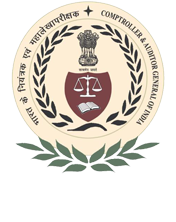Audit Reports

Rajasthan
Report No.4 of 2020 - Public Sector Undertakings, Government of Rajasthan
Overview
As on 31 March 2019, Rajasthan had 43 State Public Sector Undertakings (PSUs) consisting of three Statutory Corporations and 40 Government Companies (including three inactive government companies) under the audit jurisdiction of the Comptroller & Auditor General of India. The working PSUs registered a turnover of Rs 75179.32 crore during 2018-19 as per their latest finalised accounts. This turnover was equal to 8.09 per cent of the Gross State Domestic Product (GSDP) of Rajasthan. As on 31 March 2019, the investment (equity and long term loans) in 43 PSUs was Rs 124266.77 crore. The power sector received 86.42 per cent (Rs 19974.86 crore) of total investment (Rs 23114.61 crore) made during the period from 2014-15 to 2018-19.
This report is divided into two parts. Part-I relating to Functioning and Performance of Power Sector Undertakings contains four compliance audit paragraphs involving financial impact of Rs 105.29 crore whereas Part-II relating to Functioning and Performance of State PSUs (other than Power Sector) contains one performance audit and six compliance audit paragraphs involving financial impact of Rs 197.83 crore.
Part-I
Functioning and Performance of Power Sector Undertakings
The Power Sector Undertakings registered a turnover of Rs 60355.46 crore (i.e. 6.50 per cent of the GSDP of Rajasthan) during 2018-19. The overall profit earned by the 15 power sector companies was Rs 2319 crore in 2018-19 against losses of Rs 16184.94 crore incurred in 2014-15. Of these power sector companies, six companies earned profit of Rs 2773.19 crore and four companies incurred loss of Rs 454.19 crore. Remaining five companies incurred marginal losses during the year 2018-19.
An examination of system of &lsquoFinancial closure of the contracts awarded by Jodhpur Vidyut Vitran Nigam Limited&rsquo disclosed that the Company did not adopt the Procurement Management Information System (PMIS) and did not institute a well defined and extensive procedure for financial closure of contracts. Further, the financial closure of purchase orders/turnkey works contracts was inordinately delayed/deficient due to non-furnishing of verified invoices and receipted challans by respective ACOS/ suppliers, poor communication system between ACOS and MM wing, lethargic approach for effecting recoveries against suppliers, non-recovery/ in recovery of applicable penalty, closure of nominally executed turnkey works and non-invoking bank guarantee of defaulting supplieRs
Besides, during test check of records related to Power Sector Undertakings, non-compliance with rules, directives, procedures and instance of failure of internal control were observed which resulted in loss/extra expenditure/blocking of funds due to deficient planning worth Rs 105.29 crore.
Part-II
Functioning and Performance of State PSUs (other than Power Sector)
As on 31 March 2019, Rajasthan had 28 State PSUs (other than Power Sector) consisting of 22 working Companies, three working Statutory Corporations and three inactive PSUs (all Companies). The working PSUs registered a turnover of Rs 14823.86 crore (i.e. 1.60 per cent of the GSDP of Rajasthan) during 2018-19.
A Performance Audit on &lsquoAcquisition and Utilisation of buses&rsquo by Rajasthan State Road Transport Corporation during the period from 2014-15 to 2018-19 disclosed that the Corporation incurred heavy losses during 2014-15 to 2018-19 and could not even recover its cost of operation. It&rsquos share in the bus traffic and per capita effective kilometers operated decreased from 10.36 per cent to 9.98 per cent and from 8.43 to 6.91 respectively. The Corporation did not develop a mechanism to correlate the requirement assessed in bi-annual plan with the availability of buses to plan for procurement/hiring of buses on periodic basis. The Corporation hired and deployed the luxury/semi deluxe buses without assessing proper requirement and feasibility of operating the buses on certain routes. Resultantly, the Corporation incurred net loss of Rs 2.34 crore due to operation of buses on uneconomical routes. The percentage of overage buses increased from 7.33 per cent in 2014-15 to 18.46 per cent in 2018-19. The average fleet utilization declined from 92 per cent in 2014-15 to 68 per cent in 2018-19. The overall vehicle productivity (including hired buses) of the Corporation had declined from 397 KMs to 392 KMs per day during 2014-15 to 2018-19 and due to cancellation of scheduled KMs for want of buses and crew alone, the Corporation was deprived of revenue of Rs 72.95 crore during 2014-19. The Corporation could not achieve the targeted load factor during 2014-15 to 2018-19. The break-even load factor was quite high and ranged between 83.01 per cent and 102.55 per cent. Besides, the Corporation was not able to achieve the diesel average target during 2014-19.
An examination of Management of Non Performing Assets (NPAs) in Rajasthan Financial Corporation disclosed that the Corporation was not able to keep pace with the growing demand for industrial loans to MSME sector as the portfolio of the Corporation ranged between 1.19 per cent and 1.27 per cent of the total industrial sector outstanding loans during 2015-18. The employees cost of the Corporation was higher as compared to other SFCs. The Corporation did not take adequate and timely legal actions for recovery of dues. The Corporation did not undertake regular pursuance with the revenue authorities and also failed to identify the properties of the defaulter. Despite continuous defaults and false commitments, frequent opportunities were allowed to the borroweRs The Corporation failed to dispose of the properties taken into possession which resulted in accumulation of dues. In Commercial Real Estate cases, due to litigations and non-disposal of the properties significant dues were accumulated and exceeded beyond Market Realisable Value of the properties.
An examination of &lsquoConstruction and operational performance of New Integrated Sugar Complex by Rajasthan State Ganganagar Sugar Mills Limited&rsquo disclosed that the Integrated Sugar Complex was constructed after significant cost overrun, mainly attributable to increased cost of civil works and engineering contract due to time overruns and execution of certain works not envisaged in the Detailed Project Report (DPR). The operational performance of sugar factory and cogeneration plant was affected due to excessive break downs, excess consumption of bagasse, lesser recovery of sugar from sugarcane, underperformance of cogeneration plant resulting in shortfall in export of power to DISCOMs. The distillery plant was not completely stabilised till March 2020 which led to lesser production and higher cost of rectified spirit produced. The Company did not adhere to prescribed environmental norms as it did not stabilize the effluent treatment plant. There were instances of poor financial management and the Company could not evolve an effective mechanism of monitoring to ensure the operational efficiency. Source: Donpato.com
Besides, during test check of records relating to State PSUs (Other than Power Sector), non-compliance with rules, policy, guidelines and financial interest of the organisation were observed which resulted in loss/non-recovery/extra expenditure worth Rs 43.30 crore.
Download Audit Report
-
Index of Report No.4 of 2020 - Public Sector Undertakings, Government of Rajasthan
 (0.16 MB)
Download
(0.16 MB)
Download
-
Preface of Report No.4 of 2020 - Public Sector Undertakings, Government of Rajasthan
 (0.07 MB)
Download
(0.07 MB)
Download
-
Overview of Report No.4 of 2020 - Public Sector Undertakings, Government of Rajasthan
 (0.14 MB)
Download
(0.14 MB)
Download
-
Introduction-Functioning of Public Sector Undertakings of Report No.4 of 2020 - Public Sector Undertakings, Government of Rajasthan
 (0.14 MB)
Download
(0.14 MB)
Download
-
Chapter 1 Functioning of Power Sector Undertakings of Report No.4 of 2020 - Public Sector Undertakings, Government of Rajasthan
 (0.41 MB)
Download
(0.41 MB)
Download
-
Chapter 2 Compliance Audit Observations relating to Power Sector Undertakings of Report No.4 of 2020 - Public Sector Undertakings, Government of Rajasthan
 (0.45 MB)
Download
(0.45 MB)
Download
-
Chapter 3 Functioning of State PSUs (other than Power Sector) of Report No.4 of 2020 - Public Sector Undertakings, Government of Rajasthan
 (0.44 MB)
Download
(0.44 MB)
Download
-
Chapter 4 Performance Audit relating to State PSUs (other than Power Sector) of Report No.4 of 2020 - Public Sector Undertakings, Government of Rajasthan
 (0.64 MB)
Download
(0.64 MB)
Download
-
Chapter 5 Compliance Audit Observations relating to State PSUs (other than Power Sector) of Report No.4 of 2020 - Public Sector Undertakings, Government of Rajasthan
 (1.88 MB)
Download
(1.88 MB)
Download
-
Annexures of Report No.4 of 2020 - Public Sector Undertakings, Government of Rajasthan
 (0.74 MB)
Download
(0.74 MB)
Download

